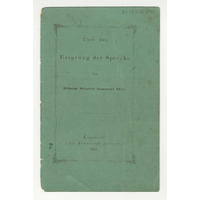Über den Ursprung der Sprache (On the origin of language)
Metadata
Über den Ursprung der Sprache (On the origin of language)
Publications and Reports
Bleek's consequential essay 'On the origin of language' (1868 [in German]) comes after his 1851 Bonn doctoral thesis and the publishing of Part 1 of his 'A comparative grammar of South African languages' (1862) and 'Reynard the Fox in South Africa; or, Hottentot fables and tales' (1864). The essay's English edition notes that Part 2 of his forthcoming 'A comparative grammar...' (1869) was then in press with Trübner & Co. of London (Bleek, 1869: xxi). Here, Bleek presents his theory of language origin, arguing an interdependence of language, thought, and culture where a meeting of emotional cries and imitative instincts, connecting feelings to sounds, ultimately begot symbolic language. Bleek theorised that language arose through cultural and historical transmission rather than a biologically innate "language instinct" (popularly theorised in modern linguistics). Bleek advanced that sex-denoting grammatical categories support mythic thinking or greater poetic conception, consequently informing a stratification of language and its evolution. While not explicitly promoting sex-denoting languages (like 'Hottentot') as superior to prosaic languages (like 'Bantu' languages), he does suggest a hierarchical typology of thought and expression that implies a form of cognitive or imaginative superiority. 'On the origin of language' marries evolutionary philosophy and comparative philology, emphasising the gradual development of language through cultural evolution, social practices, and the symbolic use of analogy.
Bound essay (with cover) in casing inside a manila folder
Ink on paper
1867
A complete and unpublished German proofing stage 'manuscript' (±A5) of Bleek's 'On the origin of language' (Weimar edition) essay with the author's handwritten corrections, inside an arsenic green cover. Printed by Van de Sandt de Villiers & Co.
Language (its origin), WHI Bleek, manuscript (unpublished), On the origin of language, Ernst Haeckel (wrongly omitted from front matter title page), Van de Sandt de Villiers & Co. (printed the manuscript)
This essay was published in both German and English with an editor's preface by WHI Bleek's first cousin, the German zoologist and evolutionist Ernst Haeckel. Haeckel was editor for the German and English editions, with his foreword appearing in both. On the reverse of the publication's front cover is a handwritten list by Bleek of the following names: Häckel, Mutter (Auguste Bleek), Huxley (Thomas Henry Huxley), Darwin (Charles Darwin), Sir Charles Lyell, Sir George Cornewall Lewis (Chancellor of the Exchequer [or GC Lewes/Lemes?]), Nicholas Trübner (?), Max Müller (?), Bishop of Natal (John William Colenso), Miss L Winkworth (perhaps Minkworth?), Julia (Lloyd?), Cranbrook (Lord Cranbrook? [there is no clear connection to Gathorne Gathorne-Hardy, 1st Earl of Cranbrook]), Carl Ritter, Dr Meiklejohn (?), Mr Sh. Forte (Forke?), 'N...' (illegible), and Lunderson. This is either a list of recipients or those to be acknowledged (see C12.59). The German proofing stage 'manuscript' printed by Van de Sandt de Villiers & Co. for the eventual Weimar edition by Hermann Boehlau (a Weimar publisher) ends on page 44, and Thomas Davidson's English translation for LW Schmidt of New York ends on page 69. A succinct summary of Bleek's main arguments in his 1851 PhD thesis can be found on page 8 of Menán du Plessis' (2014) 'The damaging effects of romantic mythopoeia on Khoesan Linguistics'. Other helpful readings include Shane Moran's (2009) 'Representing Bushmen: South Africa and the Origin of Language', Tony Voss' (2009) '[']... speak that I may see thee': Bushmen, Bleek, Language and Race in South Africa', and Michael Wessels' (2009) 'Representing Bushmen: South Africa and the Origin of Language (review)'.
Ernst Haeckel


Contributions